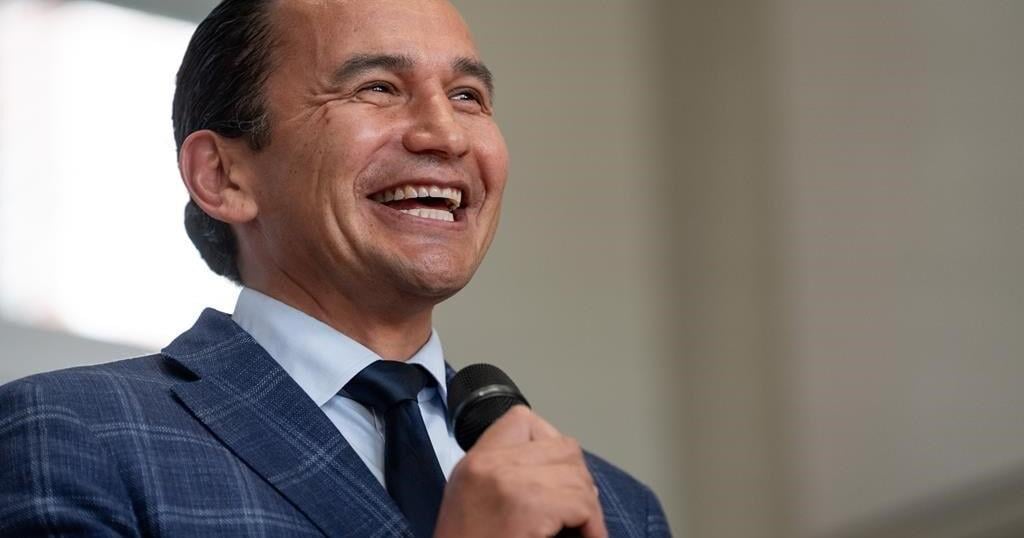WINNIPEG – Manitoba Premier Wab Kinew continues to enjoy a honeymoon with voters one year after his NDP government was elected, but there are challenges ahead in fulfilling promises to improve health care and balance the budget.
One of the things Kinew says he has learned since the Oct. 3 vote last year is that changes can’t be made quickly.
The province has seen hundreds of new health-care workers hired as part of Kinew’s election promise to “fix” health care. But more workers, equipment and space are needed.
“The change that we want for patients to be able to see improvement in health care is going to take, not just one year of doing that, but multiple years in a row of doing that,” Kinew said in an interview.
“On a personal level, I would love it if we could just snap our fingers and say, ‘New (emergency room) over here, all these people staffed up over there.’ But the reality is it will take time.”
Recent opinion polls have suggested Kinew, the first First Nations premier of a Canadian province, continues to enjoy high levels of support, both personally and for his government. The NDP won a recent byelection in the Tuxedo constituency in Winnipeg, which had been staunchly Progressive Conservative since its creation in 1979.
Kinew has been an effective user of social media and has at times made announcements directly to his tens of thousands of followers instead of at traditional press conferences.
A political analyst says there’s no immediate sign of the NDP honeymoon ending, partly because Kinew has followed through on some high-profile election promises, including temporarily suspending the provincial fuel tax in January. The tax is slated to be brought back in on Jan. 1, 2025.
“Kinew has been putting through his election promises of last summer and fall,” said Christopher Adams, an adjunct professor of political studies at the University of Manitoba.
Kinew has also succeeded in reaching out to people affected by tragedy, including the families of missing and murdered Indigenous women, and has come across as empathetic and charismatic, Adams said.
The honeymoon has also been helped because the Opposition Progressive Conservatives and Liberals are in rebuilding mode, Adams said. Both parties are operating under interim leaders and are working on restoring their party machinery and war chests.
Kinew, however, has faced some recent bumps in the road.
Mark Wasyliw, a lawyer who holds the Fort Garry seat in Winnipeg, was kicked out of the NDP caucus because a colleague is representing disgraced fashion mogul Peter Nygard on sex assault charges. The removal drew sharp criticism from the legal community.
Wasyliw, who now sits as an Independent, has criticized Kinew and accused the premier of being a bully who has strayed from NDP principles. Kinew has denied the allegations and said he has never bullied anyone on the job, yelled at any of his staff or dismissed opposing views.
The government also stirred up controversy by pausing a program that provides rent money to people at risk of homelessness. The province quickly backtracked after public outcry.
One area where Kinew admits work needs to be done is in ending the province’s chronic annual deficits. The government has registered red ink in every year but two since 2009, and Kinew has promised to balance the budget by 2027.
The government has laid out a path to balance that requires overall annual spending increases of less than 2.5 per cent. Recent provincial collective agreements include wage hikes higher than that, and the government has made other promises with price tags, such as hiring more public-sector workers, building more personal care homes, and reducing class sizes in schools.
Kinew said the government is looking at areas where it can tighten its belt, but he offered no specifics.
“You roll up your sleeves and you just go through what each department does and figure out where there are opportunities for us to be responsible with the resources Manitobans have invested in their provincial government,” Kinew said.
Adams said the government, which had criticized the former Tory government’s spending cuts, will be hard-pressed to end deficits and could see, at some point, a downgrade from credit-rating agencies.
“They’ve got to figure out the fiscal picture. The spending seems to be very, very high.”
This report by The Canadian Press was first published Oct. 3, 2024.
